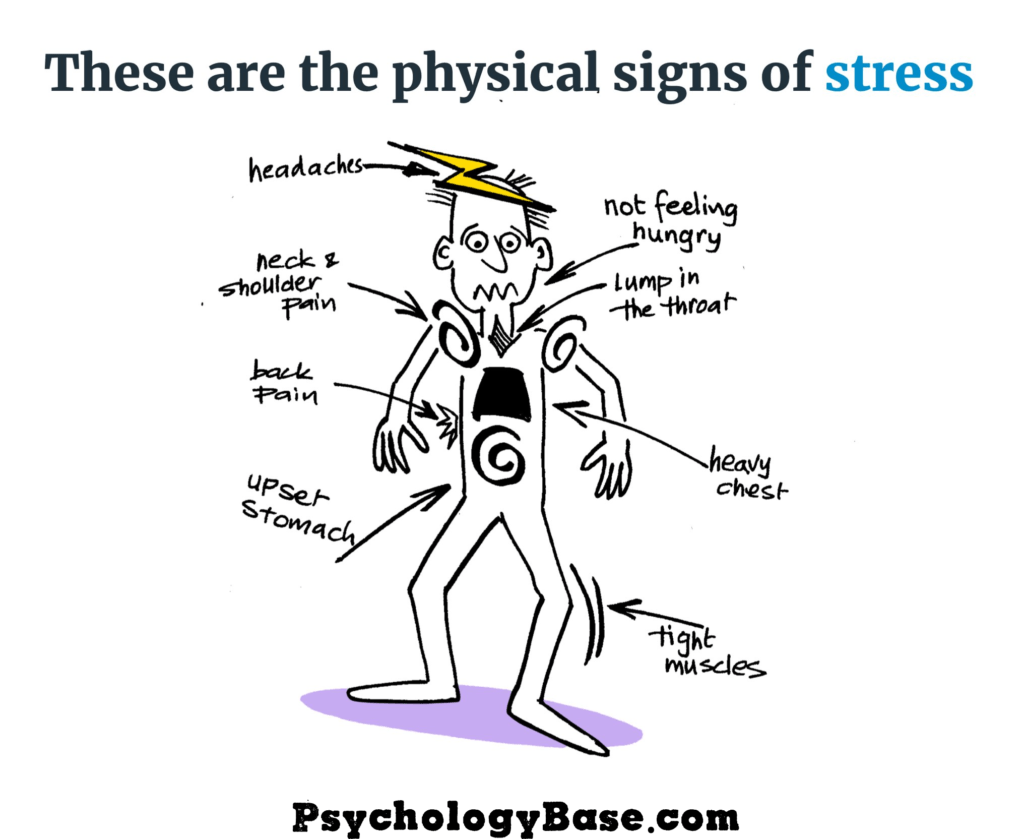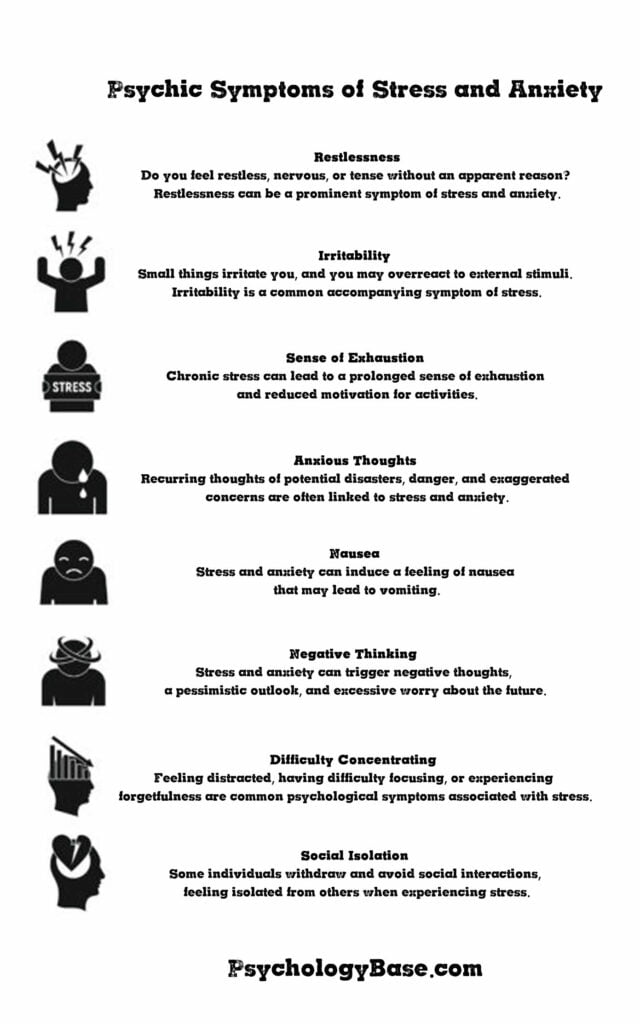We live in a world filled with challenges and relentless pace. The daily pressures and demands often accumulate, pushing us to the brink of our own resilience. It’s like a fragile rope we try to keep taut, but frequently find ourselves entangled in emotional knots. And this is where two often overlooked companions step onto the stage: symptoms of stress and anxiety.
In today’s world, symptoms of stress and anxiety are becoming increasingly prevalent. Statistics reveal that many individuals grapple with these unpleasant conditions, which can impact both our physical and mental well-being. But what exactly do symptoms of stress and anxiety entail?
In this article, we will focus on the crucial symptoms of stress and anxiety to help you recognize their presence in your life. We will explore a range of physical, psychological, and social manifestations that will enable us to comprehend how these states manifest. From headaches and insomnia to restlessness and isolation, we will delve into these key symptoms together, providing you with valuable insights and strategies for managing them effectively.
Prepare for an in-depth exploration of the world of symptoms of stress and anxiety that influence our lives. Together, we will discover how to identify these symptoms and navigate through them to find inner calm and tranquility.
Join us to gain valuable insights into the symptoms of stress and anxiety and uncover effective strategies for coping with these conditions. It’s time to take the first step toward better health and well-being. Let’s overcome these challenges together and find a path to balanced and happy living.

Definition of Stress and Anxiety
Stress and anxiety are common emotional states that affect many individuals in a world filled with challenges and uncertainties. Before delving into the manifestations of these conditions, it’s important to clarify what exactly stress and anxiety mean.
Stress is a physiological and psychological response to various pressures we encounter. It can stem from external factors such as work demands, personal issues, or lifestyle changes. Stress triggers various reactions in our bodies, including increased heart rate, muscle tension, elevated levels of cortisol (the stress hormone), and more.
Anxiety is an emotional state associated with worry, fear, and restlessness. It can manifest in various ways, such as feelings of uncertainty, panic, excessive fear, or tension. Anxiety can impact us not only in the psychological realm but also through physical symptoms, such as heart palpitations, shortness of breath, or digestive issues.
Understanding these definitions provides a fundamental framework for comprehending the symptoms of stress and anxiety that we will explore further. Get ready for an in-depth look into the individual manifestations and strategies to deal with them effectively. Together, we will discover approaches that will help you better understand how these states influence your life and how to cope with them.
The next step involves examining the physical symptoms of stress and anxiety, which will assist us in gaining a better understanding of how these conditions manifest in our bodies.

Physical Symptoms of Stress and Anxiety
Stress and anxiety can have a significant impact on our bodies. Physical symptoms are often the first signals that alert us to being exposed to high levels of stress. Here are some of the most common physical symptoms associated with stress and anxiety:
- Headaches: Intense headaches, migraines, or pressure in the temples can be a result of tension and stress.
- Sleep problems: Insomnia, difficulty falling asleep, or waking up in the middle of the night can be associated with stress and anxiety.
- Muscle tension: Tension and cramps in muscles, particularly in the neck, shoulders, and back, can be a consequence of emotional strain.
- Appetite changes: Some individuals tend to overeat, while others lose their appetite and experience weight loss due to stress.
- Digestive issues: Do you experience digestive problems such as abdominal pain, bloating, constipation, or diarrhea? These symptoms can be linked to stress and anxiety.
- Heart rate changes: Stress and anxiety can cause an increased heart rate, heart palpitations, or a sensation of pounding in the chest.
- Breathing difficulties: Some people may experience shortness of breath, labored breathing, or an anxious feeling related to their breathing when under stress.
- Fatigue and exhaustion: Stress and anxiety can lead to feelings of fatigue and exhaustion, affecting your energy levels and concentration.
Remember that physical symptoms of stress and anxiety can vary among individuals. If you notice any of these symptoms in yourself, it’s important to take care of yourself and seek ways to reduce stress and improve your physical and emotional well-being.

Psychic Symptoms of Stress and Anxiety
In addition to physical manifestations, stress and anxiety can also impact us on a psychological level. These psychic symptoms can influence your mood, thinking, and overall well-being. Here is a list of some common psychic symptoms associated with stress and anxiety:
- Restlessness: Do you feel restless, nervous, or tense without an apparent reason? Restlessness can be a prominent symptom of stress and anxiety.
- Irritability: Small things easily irritate you, and you may overreact to external stimuli. Irritability is a common accompanying symptom of stress.
- Nausea: Stress and anxiety can induce a feeling of nausea that may lead to vomiting.
- Difficulty Concentrating: Feeling distracted, having difficulty focusing, or experiencing forgetfulness are common psychological symptoms associated with stress.
- Negative Thinking: Stress and anxiety can trigger negative thoughts, a pessimistic outlook, and excessive worry about the future.
- Sense of Exhaustion: Chronic stress can lead to a prolonged sense of exhaustion and reduced motivation for activities.
- Anxious Thoughts: Recurring thoughts of potential disasters, danger, and exaggerated concerns are often linked to stress and anxiety.
- Social Isolation: Some individuals withdraw and avoid social interactions, feeling isolated from others when experiencing stress.
It’s important to recognize that psychic symptoms of stress and anxiety can vary individually and manifest differently in each person. If you notice these symptoms in yourself, seeking support and finding ways to reduce stress and improve your mental well-being is advisable.
Social and Behavioral Symptoms of Stress and Anxiety
Stress and anxiety can also impact our social interactions and behavior. These symptoms can affect our ability to communicate with others and fully engage in social life. Here is a list of some common social and behavioral symptoms associated with stress and anxiety:
- Isolation: Do you feel the need to withdraw and avoid social situations? Stress and anxiety can lead to social isolation and limited contact with other people.
- Relationship Irritability: Stress and anxiety can heighten sensitivity and irritability in relationships with partners, family, or colleagues.
- Escapist Behaviors: Some individuals attempt to escape from stressful situations through unhealthy mechanisms such as excessive alcohol consumption or dependence on other substances.
- Perfectionism: Pressure and stress can lead to excessive focus on perfectionism, constant self-demands, and fear of making mistakes.
- Limiting Social Activities: People with high levels of stress and anxiety may restrict their participation in social events, hobbies, or other activities they would otherwise enjoy.
- Nervousness in Public: Feeling nervous, chest tightness, or apprehension about public speaking or performing are common symptoms of stress and anxiety.
- Avoidance Behavior: Some individuals tend to avoid stressful situations or activities that trigger anxiety.
- Decision-Making Problems: Stress and anxiety can make it difficult to make clear decisions and trust one’s own abilities.
It’s important to recognize that social and behavioral symptoms of stress and anxiety can vary among individuals. If you experience these symptoms, seeking support and finding healthy ways to manage stress is crucial for your overall well-being.

Recommendations for Managing Stress and Anxiety
Managing stress and anxiety is crucial for maintaining good physical and mental health. Here are several recommendations to help you cope with stress and anxiety:
- Healthy Lifestyle: Pay attention to your lifestyle and focus on a balanced diet, regular sleep, and sufficient physical activity. These factors can significantly impact your overall well-being and help alleviate symptoms of stress and anxiety.
- Relaxation and Breathing Exercises: Try relaxation techniques such as deep breathing, meditation, or yoga, which can help you relax, reduce tension, and alleviate symptoms of stress and anxiety.
- Social Support: Seek support from family and friends, as social connections can provide comfort and assistance in managing stress and anxiety. Don’t hesitate to ask for help when needed.
- Organization and Planning: Create plans and organize your time effectively. Having a structured approach can reduce the sense of losing control and assist in managing stressful situations.
- Hobbies and Recreation: Engage in activities that you enjoy and find relaxing. Pursuing hobbies and engaging in fun activities can help reduce stress and anxiety symptoms.
- Setting Boundaries: Learn to say “no” and establish boundaries. Avoid overcommitting yourself and prevent stress and anxiety from overwhelming your life.
- Professional Help: If stress and anxiety become persistent and difficult to manage, seeking professional help such as psychotherapy can be beneficial in addressing underlying issues and developing effective coping strategies.
Remember that everyone may have individual needs and strategies for managing stress and anxiety. It’s important to find a combination of techniques that work best for you and your specific needs. Taking proactive steps to manage stress and anxiety can significantly improve your overall well-being and quality of life.
Step-by-Step Guide to Managing Stress
Stress is an inevitable part of life, but that doesn’t mean we are helpless in the face of it. There are several effective strategies and steps that can help us cope with stress and minimize its negative impacts. Here is a step-by-step guide that will provide you with specific actions to deal with stress:
1. Identify the Sources of Stress
The first step in effectively managing stress is to identify the sources that trigger it. Be aware of situations, individuals, or events that cause you stress. It could be work responsibilities, financial pressures, interpersonal relationships, or personal expectations. Identifying these sources will enable you to take action to manage them.
2. Take Control of Your Life
While we may not have control over all the circumstances that stress us out, we can control how we respond to them. Take control of your life by focusing on things you can influence. Have a clear plan, set priorities, and learn to say “no” to things that overwhelm you.
3. Seek Relaxation Techniques
Relaxation is key to reducing stress. Try different relaxation techniques such as deep breathing, meditation, yoga, or regular physical activity. Find time for activities that calm and energize you, such as reading, listening to music, nature walks, or engaging in artistic pursuits.
4. Take Care of Your Body
Physical well-being plays an important role in stress management. Get regular sleep, eat healthily, and avoid overworking yourself. A healthy diet and adequate rest help maintain your body and mind in optimal condition for dealing with stressful situations.
5. Find Support in Your Surroundings
Don’t hesitate to seek support from family, friends, or professionals. Talking about your feelings and sharing your concerns with trusted individuals can help release tension and provide you with new perspectives. Support and understanding from others can be crucial in managing stress.
Following this step-by-step guide can help you develop the skills necessary to effectively manage stress. Remember that each individual is unique, and it may be necessary to experiment with different strategies to find what works best for you.
5 Helpful Resources for Managing Stress and Anxiety
- Mental Health America Mental Health America is an organization that provides extensive resources and information on mental health, including articles and tools for managing stress and anxiety.
- Anxiety and Depression Association of America The Anxiety and Depression Association of America (ADAA) is an organization focused on anxiety and depression, offering information, support, and resources for individuals dealing with stress and anxiety.
- Calm Calm is a mobile application for meditation and relaxation. It offers various breathing exercises, meditation sessions, and soothing sounds to help reduce anxiety and stress.
- Stress Management Society The Stress Management Society focuses on stress management and provides helpful tips, articles, and tools for reducing stress levels and improving overall mental well-being.
- National Institute of Mental Health The National Institute of Mental Health conducts research and provides information and resources on various mental disorders, including stress and anxiety. Their website offers useful articles and brochures for managing stress.
- Also You can find a wide range of books on stress management and coping with anxiety on Amazon.
Please note that while these external resources provide valuable information and support, it’s always advisable to consult with a professional, such as a physician or therapist, for more severe symptoms of stress and anxiety.
What next?
The Unseen Battle – Depression Among Youth
Icy Showers: Unexpected Advantages and Hazards for Body and Mind
The Brain’s Reward System: How It Shapes Our Behavior and Motivation






